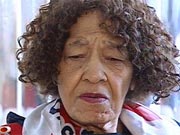Apparently, some supporters of Rep. Julia Carson (D) would like people to believe her Republican opponent Eric Dickerson is a failed businessman as suggested by comments from her supporters on area blog sites, including this one. They suggest that by selling his Buick dealership this past summer this somehow confirms that he must be a failed businessman. One blogger, in support of Carson,
referred to “Dickerson’s failed Buick dealership” in the same breath he accused others, including your’s truly, of slinging mud on behalf of Dickerson. Let’s examine the facts a little closer and compare Dickerson’s business success to that of Carson’s.
Dickerson rose up through the ranks of General Motors and Rolls Royce beginning 27 years ago and became a successful business executive. In 1999, he became a business entrepreneur by opening a Buick dealership he successfully operated for 7 years before selling out to Ed Martin. While Carson’s supporters wish to portray the sale as evidence of him being a failed businessman, it had much more to do with the changing automobile industry. It is no secret that GM is engaged in a major downsizing and consolidation effort. The Buick division has been reduced to just three model lines. These changed circumstances made it unwise for anyone in Dickerson’s shoes to continue operating a single, dwindling automobile line. His decision to sell it was a practical business decision as much as anything else. In addition to his Buick dealership, Dickerson also purchased a Maggie Moo franchise last year.
For those who insist on making his business success or failure an issue in this campaign, I think it is only fair to compare his business record to that of Ms. Carson’s. While she has spent most of her adult life as a career politician, she did venture into the private sector by opening an upscale fashion boutique, J Carson, in Claypool Court in downtown Indianapolis in 1985. As the
Indianapolis News described the clothing store in a October 1, 1985 new story: “Offering women the latest fashions at reasonable prices is just another way the legislator believes she can serve her constituents. “No conflict of interest,” then-State Sen. Julia Carson told the
News. Or was there?
A little more than a year later the
Indianapolis Star’s George Stuteville reported on November 19, 1986, that a few Center Township workers were facing reprimands over a clothing dispute with Carson. It seems that Center Township had established a voucher program which allowed poor Center Township residents to redeem vouchers at approved vendors to purchase clothing for themselves and their children. The approved vendors included Stacy’s Discount Clothes, Zayre, Today’s Fashion and J. Carson. One of those vendors alone was granted a special benefit. Carson chose to participate in a program which permitted the vendors to rent space in the township’s warehouse to display their clothing. Carson, however, was permitted to display her clothing in the Center Township officers where the vouchers were being issued because she complained there was no heat in the warehouse. Carson then complained after picking up only 5 of the 37 vouchers initially issued that the township employees were discouraging the recipients from her. Stuteville reported:
[Center Township Trustee Charles] Walton said it looked as if her store was being boycotted by trustee workers who thought the veteran state legislator must have had an unfair advantage by placing her merchandise in the township trustee’s office building.
“Julia has political enemies. There is a lot of infighting going on: partisans of the other vendors don’t want J. Carson’s to get the vouchers. It looks like they took it upon themselves to make that decision,” said Walton.
The flip side of the argument was that the trustee workers were actually doing the taxpayers and the voucher recipients a favor because the prices on the clothing offered by the other vendors were less expensive. Carson’s take was obviously different. She told Stuteville, “I could see my enemies screaming if I were giving indigents poor quality clothing, but I am competitive with my costs. I don’t do no markup on them. Why not let a poor kid have a damn good coat?”
Favoritism or not, it was not enough to save J. Carson’s from failure. The
Indianapolis Star reported on October 15, 1987 that her landlord, Claypool Development Co., sued her for more than $74,199 in back rent and unpaid assessments for her clothing store. It appeared she hadn’t paid rent for some time as the story reported her monthly rent was $2,923. Carson shared a different view of the situation with the
Star: “We reached an agreement two weeks ago and I guess it’s a matter of not communicating the agreement,” Carson said. “This is just an error that they filed the lawsuit.” On February 24, 1990, the
Indianapolis News reported that “State Sen. Julia M. Carson’s wages are being garnished to help pay off a debt from a failed business venture.” The
News said Carson was the only member of the legislature to have her wages garnished.
At the same time, the
News reported that Carson was delinquent in the payment of more than $10,000 in property taxes on two properties she owned. Carson told the
News, “I don’t apologize for not making a business work.” In a separate news story, Carson told the
News she disputed the taxes owed on one of the properties. “The apartment building itself has been dormant for over 10 years,” Carson said. “It’s only the house that should be taxed and not the apartment building.” “But it’s not.” “It’s a single-family dwelling,” she added. That’s an argument that hardly works with an honest assessor.
Later, when Carson would become Center Township Trustee, she revamped the voucher program so that only one store, Doris’ Outlet, qualified to provide clothing to the poor. The store was owned by Doris and Louis Morse, who refused to answer questions of
Indianapolis Star about the arrangement. A
Star analysis in 1993 of the store’s prices determined that they were much higher than those at discount stores. Carson called it an oversight at the time according to the
Star. “It will never happen again as long as I am trustee,” she told the
Star. But when supporters of her Republican opponent for Congress in 1996 purchased clothing from Doris’ Outlet, they discovered that some clothing items cost several times the cost of the items at discount stores like Value City. Carson defended Doris’ Outlet because it was closer than the other stores. She told the
Star she had to purchase transportation for clients if she sent them to stores like Value City with their vouchers. To her Republican opponent, Virginia Blankenbaker, Carson was ripping off the taxpayers. “She is gouging the taxpayers,” Blankenbaker told the
Star on October 10, 1996. “Julia had some questionable things going on. She said they would be corrected, and in fact they weren’t,” she added. Blankenbaker also criticized Carson for giving township jobs to her own daughter and two grandsons. Carson defended the hiring of family members. “I have no qualms,” she told the
Star.
Now, supporters of Carson will invariably scream that it’s mudslinging to raise legitimate news stories that have been written about Carson’s past. These are matters which are a part of the public record. Instead of accusing AI and others of making up stories about Carson, her defenders would do well to take a trip over the state library or the Marion County library and search the news archives as this blogger did instead of sitting on their butts and attacking anyone who dares to report on her record. It’s all right there in black and white. If you want to accuse someone of mudslinging, then start with the newspapers who reported these items as newsworthy in the first instance. And when you do that you might find a few more items of interest, including the following:
· While then-state senator Carson thought it was just fine for the township to fork over more money to let the poor buy her clothes, she was less charitable towards the needs of the poor when she became Center Township Trustee. Incredibly, one of Carson’s first policy decisions in office was to tell AFDC recipients that they would be ineligible for poor relief. Can you imagine if a Republican had done the same thing? Her handling of poor relief triggered a lawsuit on behalf of recipients by the Indiana Civil Liberties Union, which forced her to rescind the policy, as well as a process that denied benefits without due process. As to an argument made by Ken Falk of the ICLU that she was trying to discourage people from applying for poor relief, Carson said, “That is not true. He’s having a pipe dream. We’re throwing money around here like south going north.”
Indianapolis Star, February 28, 1991.
· Carson was right on target when she said the township was “throwing money around here like south going north.” Carson got her own salary increased 63.5% during the 6 years she served as Center Township Trustee. Carson made the decision to purchase the former Standard Life Insurance building, now known as the Julia Carson Government Center. When she acquired it with taxpayer funds for $350,000, she said taxpayers would have to spend another $2-$3 million to renovate the building. As it turned it, it cost $5 million to renovate the building. While she promised to make it one-stop shopping for all Center Township needs, only a small part of the township’s offices were ever re-located to the building. Not long after she said that, Carson announced the township would not need all the space and “some would be leased and some may be used for “entrepreneurial opportunities.” We’re looking at forming small businesses for people,” she said. When she was elected to Congress, she insisted on having her own congressional office in the building with a view of the downtown skyline. “This is the office where you watch fireworks,” she said, admiring her view of Downtown.
Indianapolis News, April 15, 1994;
Indianapolis Star, June 19, 1996;
Indianapolis Star, October 10, 1996.
· Carson demonstrated how she exacts revenge on people who don’t obey her command when she served as township trustee. She fired three township employees who refused to support her candidate for township constable, Mark “Tony” Duncan, who was running to succeed a previous constable, Taylor Seaths, who pleaded guilty to federal mail fraud charges. The township eventually settled a lawsuit for $60,000 and tens of thousands in wasted attorneys fees at the urging of Carson’s attorney, Virginia Dill McCarty, in 1996 as she launched her bid for a congressional seat. The
Star reported, “Despite a state unemployment ruling to the contrary, McCarty and Carson maintain the men weren’t fired.” “They just didn’t show up for work,” Carson said. The ICLU saw it differently. “These guys didn’t get rehired because of politics,” Rich Waples said. “They have a right not to be denied these jobs.” He described it as “a straight First Amendment claim.”
Indianapolis Star, March 28, 1996.
· In 1994, the
Indianapolis Star reported that the Marion County Election Board had determined that a political action committee operated by Carson and her successor, Carl Drummer, known as Democrats United for Victory, had used the PAC’s funds improperly by making gifts and loans from the PAC to township employees. Carson told the Board the PAC had stopped making illegal loans and gifts to employees. “It’s unfortunate,” she said of the violations. “It’s nothing that was deliberate.” The Board voted 2-1 to let Carson and Drummer off with a warning after their pleas for leniency rather than refer the two to the Marion County prosecutor's office for prosecution.
Indianapolis Star, December 14, 1994.






